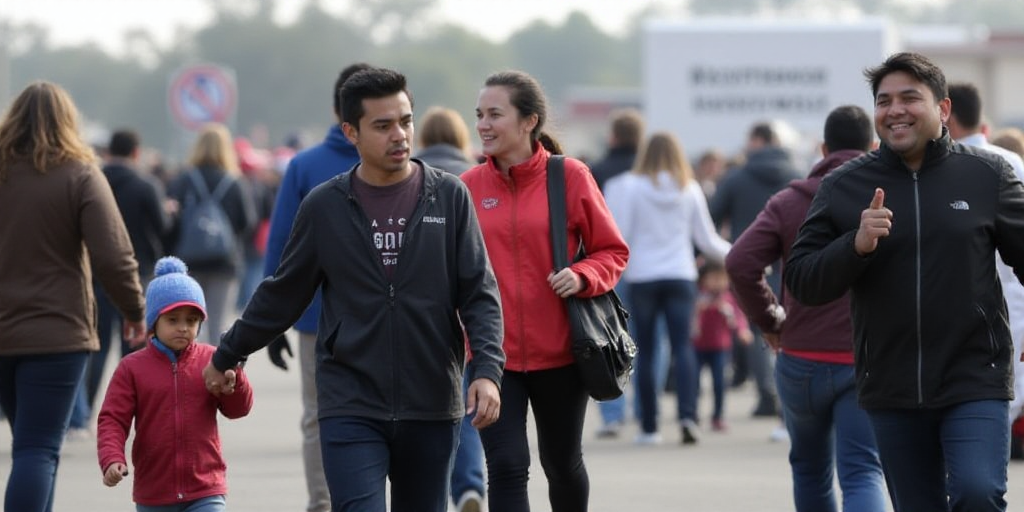Migrant Support Organizations in the U.S. Challenge Current Immigration Policies
Non-governmental organizations (NGOs) in the United States that assist migrants have warned of accelerated deportations and due process violations against Mexican nationals and migrants detained by U.S. immigration authorities.
Rights of Migrants Under Threat
Defenders of migrant rights in the U.S. have highlighted that fundamental rights guaranteed by the U.S. Constitution, such as the right to silence, access to legal counsel, and consular assistance, are being disregarded.
Dulce Guzmán, executive director of Alianza Americas, stated that the ICE is conducting aggressive detentions, leaving many families unaware of their loved ones’ whereabouts and unable to locate them through the federal government’s online system.
“It is more urgent than ever for individuals to know their rights, be prepared, connected with a reliable organization, and seek legal help immediately,” Guzmán emphasized to El Economista.
She further explained that due process is protected by the U.S. Constitution and the Immigration and Nationality Act (INA), regardless of migratory status. However, recent policies have completely removed access to due process.
For instance, expedited removal allows for immediate deportation without a court hearing, and this legal provision was expanded since January 21, 2025, to apply nationwide to anyone unable to prove at least two years of continuous U.S. residence.
Legal Challenges and Concerns
Sergio Infanzón, a member of the Southeast Leadership Network and national liaison for the Migrant Community, noted that under normal circumstances, detentions involve an initial case assessment with the possibility of bail and at least two hearings before an immigration judge.
“However, given the current situation, most detained individuals are not being reported or are bypassing this process and are being deported immediately,” he denounced.
Right to Silence
“First, a detained person should exercise their right to remain silent and request a lawyer,” Infanzón explained.
He warned, however, that many individuals are being taken to detention centers without their constitutional rights respected and, in some cases, are deported without even appearing before a migration court.
Infanzón was firm regarding the legal possibilities for deported individuals: “Under this government, it will be extremely difficult for someone already outside the country to initiate a legal process to return. To file a lawsuit, you must appear in court, sign documents. They are not allowing it.”
Lawsuits
Infanzón also mentioned that various organizations have pursued legal actions.
“From the first day of this administration, we have been filing lawsuits,” he said, recalling that even the California governor sued the federal government for sending the National Guard to the streets without prior consultation.
“We are in a back-and-forth of counterclaims and judicial rulings, which is a very complicated situation,” he said.
Despite the adverse context, Infanzón assured that migrant communities are reorganizing.
“We have been preparing for decades, but we’ve never seen a level of rights violation like the current one. We are regrouping and bringing new energy to the movement,” he said.
Justice and Human Rights in the U.S.: A Report by WJP
According to the World Justice Project (WJP), the United States ranked 26th out of 142 countries in the 2024 Rule of Law Index, maintaining its position and score from the previous year.
With an overall score of 0.70 out of 1.0, the country falls below the regional average (0.73) for Europe, EFTA, and North America but above the global average (0.55).
The WJP report indicates that the country lags in “Civil Justice,” “Criminal Justice,” and “Fundamental Rights,” with the latter scoring below the regional average (0.77), representing one of the most significant discrepancies.
Scoring 0.63, the U.S. ranks 33rd among 142 countries in civil justice. However, breaking down the indicators shows that the country ranks last within its region (31/31) and high-income group (47/47) for affordable access to civil justice, scoring a mere 0.48.
In the absence of discrimination subfactor, it scores 0.40 and ranks globally 115th.
Although it excels in corruption absence (0.83) and availability of alternative dispute resolution mechanisms (0.79), civil judicial processes still suffer from undue influences (0.68) and procedural delays (0.58).
With a score of 0.68, the U.S. ranks 37th globally in fundamental rights, with no progress since 2023. It performs well in freedom of expression (0.71) and assembly and association (0.79), but faces setbacks in equal treatment (0.50) and labor rights (0.56).
Key Questions and Answers
- What are the concerns raised by NGOs regarding migrant processing in the U.S.?
NGOs have expressed worry about accelerated deportations and violations of due process for Mexican nationals and migrants detained by U.S. immigration authorities, including disregard for constitutional rights such as the right to silence, access to legal counsel, and consular assistance.
- What rights are guaranteed to migrants under the U.S. Constitution and INA?
The U.S. Constitution and the Immigration and Nationality Act (INA) guarantee fundamental rights to migrants, including the right to silence, access to legal counsel, and consular assistance, regardless of their migratory status.
- How have recent policies affected access to due process for migrants?
Recent policies, such as expedited removal, have eliminated access to due process for individuals without regular migratory status, allowing immediate deportation without a court hearing.
- What legal challenges are organizations pursuing against current immigration policies?
Various organizations have been filing lawsuits since the beginning of the current administration, including a lawsuit by the California governor against the federal government for deploying the National Guard without prior consultation.
- How does the U.S. fare in the 2024 Rule of Law Index by the World Justice Project (WJP)?
The U.S. ranked 26th out of 142 countries, with an overall score of 0.70. It falls below the regional average but above the global average. The country lags in civil justice, criminal justice, and fundamental rights, with notable discrepancies in the latter category.






